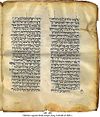Progressive Christianity
Progressive Christians regard the Gospel of Christ through a type of prosperity theology[1] in which common ground is often found in the politics of left-leaning viewpoints and thus progressive social liberation agendas predominately founded in the early parts of the 20th century.[2] Their theological foundation accumulates into consistency that runs counter to a critical biblical exegesis. Essentially, the eisegesis of progressive Christianity with an inherent political and economic nature has as its central doctrine the amelioration of social inequality and injustice. It is to produce economic liberation for the poor, and of course separate from the progressive means this stance is indeed biblical. However overwhelming secular appeal is not and prosperity theology that underpins progressive Christianity questions traditional (conservative) theological foundations and political institutions.[3][4]
Black Liberation Theology
A controversial alternative theology created amidst the 1960s civil-rights activism. Black liberation theology is a particular way to interpret the Bible, specifically the Gospels, into a focus on the mistreated, poor and down-trodden of the world in general, but the United States society in particular. It became synonymous with the Africans historical focus on European slavery. The 1960's black liberation theology and amelioration of social injustices even to this day runs deep within the minds of liberal Democrats and the African-American culture within the United States.
Essentially a postmodern (enlightened-literal eisegesis) interpretation that derives a social-religious doctrine, embracing a type of collective salvation black liberation theology is determined upon the whole of society to lift the poor out of poverty into wealth. An Afro-centric re-orientation of the Gospels from the so-called white perspective recognizes and illuminates the uniquely oppressed black community by reading in their particular struggle. Black liberation even goes so far as to portray Jesus, "... as a brown-skinned revolutionary." The characteristics of Christ highlighted when following black liberation theology is not salvation of mankind through faith in His life, death and resurrection but rather His determined acts of helping eradicate poverty in society. This particular reading of Scripture found common ground and appealed to the black community, effectively Cone deemed this approach toward eisegesis as especially prescient because he saw whites being economically oppressive towards blacks.[5]
Black liberation theology was summed up in A Black Theology of Liberation By James H. Cone published in 1970.[6][7] James Cone within the book points to the central biblical foundation for his liberation theology, and thus by his particular eisegesis black liberation theology. It is from verses 17-20 of Luke chapter 4 that Cone determined Jesus work was essentially liberation, which is true, but the unique eisegesis interpreting the Bible as foreshadowing African history with slavery is very misleading.
17And the book of the prophet Isaiah was handed to Him. And He opened the book and found the place where it was written, 18"THE SPIRIT OF THE LORD IS UPON ME, BECAUSE HE ANOINTED ME TO PREACH THE GOSPEL TO THE POOR. HE HAS SENT ME TO PROCLAIM RELEASE TO THE CAPTIVES, AND RECOVERY OF SIGHT TO THE BLIND, TO SET FREE THOSE WHO ARE OPPRESSED, 19TO PROCLAIM THE FAVORABLE YEAR OF THE LORD." 20And He closed the book, gave it back to the attendant and sat down; and the eyes of all in the synagogue were fixed on Him. Luke 4:17-20
Nation of Islam
The Nation of Islam founded in 1930's Detroit, Michigan by W. D. Fard Muhammad (1877-1934) precedes contemporary black liberation theology and maintains a more explicit form within the many declarations of W. D. Fard Muhammad and his first disciple Elijah Muhammad (1897 to 1975). It is related to Christianity and Islam because the NOI teaches that W. D. Fard Muhammad is both the Messiah of Christianity and the Mahdi of Islam. It is based around white oppression with a deeply woven eisegesis reading into the Bible unique NOI history and teachings that Louis Farakahn (current leader of NOI) uses in an attempt to validate the black race and determine theologically, by way of the Bible, the importance of the African struggle with slavery.[8]
References

